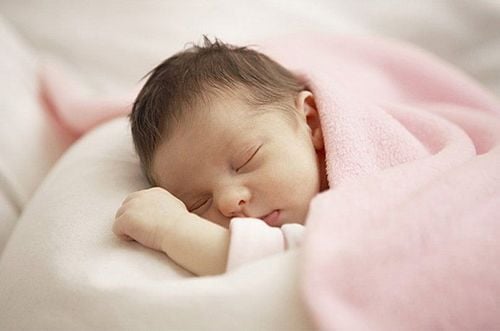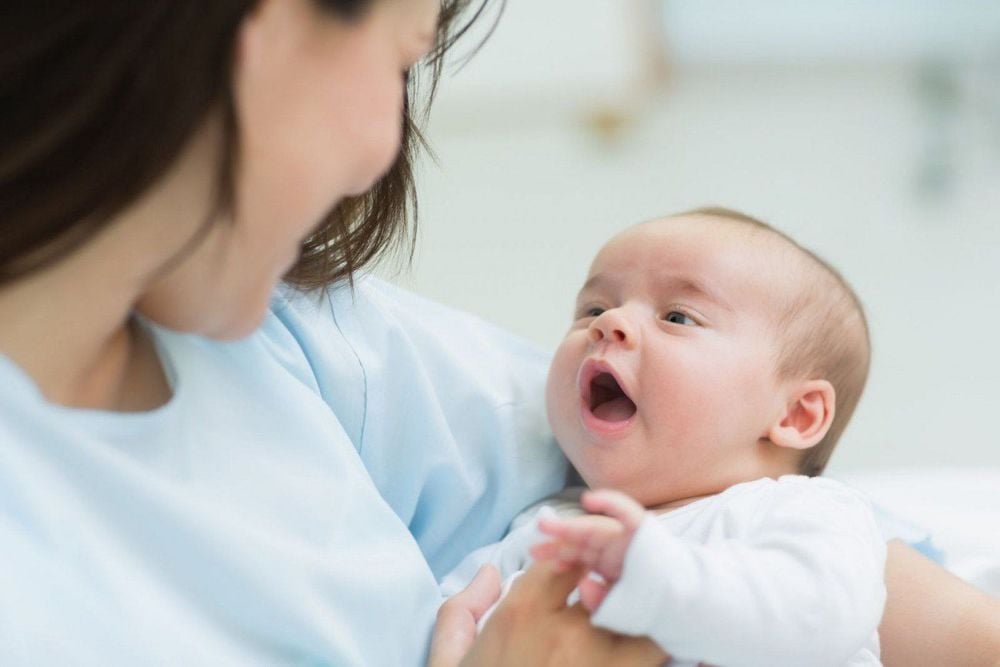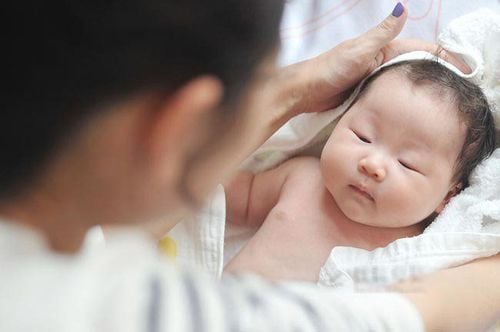This is an automatically translated article.
The article is expertly consulted by Master, Doctor Phan Thi Cam Van - Neonatologist - Department of Pediatrics - Neonatology - Vinmec Danang International General Hospital. He has 7 years of experience as a Resident Doctor and a Pediatrician - Neonatal Doctor at Hue Central Hospital and Hue University Hospital of Medicine and Pharmacy. Her strength is in the treatment of Pediatric diseases of Respiratory, Digestive, infectious diseases, newborn care and treatment, neonatal resuscitation.Newborns are too immature, so parents need to be a little more careful and thoughtful in taking care of their baby in the first 7 days of perinatal life, this is one of the important early life changes of child.
1. What is the perinatal period?
The perinatal period is counted from the 28th week to the end of the 7th day after birth (the first week after birth). Perinatal is understood as around the time when a mother gives birth to a baby, this is a big change not only for the mother but also for the baby.
During the perinatal period, the baby will have to go through an important transition of living environment, from living in the mother's womb to receive nutritious food directly through the umbilical cord, to moving to an ectopic environment. Moreover, the environmental temperature also changes, in the mother's body it is 37 degrees Celsius outside in the natural environment, it fluctuates at 25-27 degrees Celsius, causing children to learn to adapt themselves. There are cases, the newborn does not pass this first week, unable to adapt, leading to death, it is still said that it is a perinatal death. Therefore, this is the period when mothers and babies need the most attention, protection and proper care.
2. Taking care of children in the perinatal period
The perinatal period is one of the most important early stages of a baby's life. Therefore, parents should learn the best way to take care of their children to create momentum for a comprehensive development.
Ensure enough sleep for your baby According to many experts, growth in infants is largely achieved through sleep and breastfeeding. It's completely normal for babies to take a lot of naps both night and day; Because, your baby's sleep will enter a more stable cycle starting from the fourth month. However, when sleeping, both parents also give the baby a certain safe distance.

Đảm bảo giấc ngủ đủ cho con
Breastfeed as soon as possible If the mother does not have milk, she can temporarily breastfeed the baby, until milk is available, the mother should increase breastfeeding and breastfeed as soon as possible so that the baby can receive the right amount of milk. nutritious colostrum. The length and frequency of feeding depends on the baby's needs. Most babies need to be fed every 2-4 hours and about 8-12 times a day. Mothers also pay attention to the correct sucking position and way of feeding, to help the baby absorb the necessary amount of nutrition.
Baby's skin is still immature Newborn skin is very thin, weak and prone to jaundice. Usually the baby's skin turns yellow on the 2nd day after birth and by the 4th, the yellowness decreases. At this time, the baby's skin layer begins to change to help him retain heat and protect him.
The layer of "causing" substance that covers the outside of the baby's skin in the first day of birth has the role of retaining heat and protecting the baby's skin. Therefore, do not bathe to clean the "causing" substance on the baby's skin immediately after birth. From the second day on, this layer of "causing" substance is a very favorable environment for the possibility of skin infection. Therefore, 24 to 48 hours after birth, the baby must be bathed every day.
Take care of your baby's eyes, the window to your baby's soul Newborns often have tears and discharge in the first few days after birth. Conjunctivitis can occur during the first week if eye care is not taken. Therefore, parents should note:
Immediately after birth, the baby's eyes should be cleaned with sterile gauze or a separate towel. This towel must be soaked in cool and cooked water. Babies are usually given eye drops or eye ointment by midwives after wiping their eyes within an hour of birth. Be careful not to let the tip of the bottle or the tip of the ampoule touch your baby's eyes. After taking a small bath with physiological saline 1 time / day. Taking care of the baby's umbilical cord The first thing that mothers care about in a newborn baby is the need to take care of the umbilical cord with safe hygiene. In the first week, the baby's umbilical cord will not fall off, so we need to pay attention to the problem, the 1 week old baby's umbilical cord must always be kept dry and clean until the day it dries and then falls off.
Since this is the first week of your baby's birth, your baby's umbilical cord may fall off during the week, keep the umbilical cord clean and dry and let it fall off on its own. If there is some blood or mucus on the diaper or shirt from the umbilical cord, take extra care when cleaning and dry with cotton wool. It is best to clean and care for the navel area immediately after bathing.
Babies always need to be kept warm In the perinatal period, the first week a newborn has not adapted and the baby's body lacks warmth, so you need to pay attention to keeping the baby warm often, not to cold child. To know that the baby may not be warm enough, you can touch the back of your hand or foot, the back of your baby's neck to feel the temperature on your baby's skin. If possible, take a thermometer to know what the baby's body temperature is so that you can better keep the baby warm.
A baby's body is like ours, with cold weather, moms can wear warm clothes, hats and don't forget to wrap a thin towel outside when breastfeeding.
3. Note when taking care of your baby
No need to wear a hat continuously If wearing a closed hat for your child even in hot weather not only makes the child itchy and uncomfortable, sweating a lot, but also increases body temperature, making the child susceptible to fever, which is dangerous.
Therefore, hats should only be worn for babies when the temperature is low, for children to go outdoors or for premature and low birth weight babies. As for normal healthy children, there is absolutely no need to wear a hat continuously, especially in hot weather.

Cho bé thoải mái nhất có thể
Should not swaddled tightly Many parents prefer tight swaddling so that the baby is warmer, sleeps better and deeper, less fussy. However, many scientific studies show that this action can force the child's hip joint to straighten and forward, causing the child's leg to be misaligned. In addition, tight diapers also cause children to suffocate, secretive and hot, uncomfortable, especially not good when children go to sleep.
Hygiene and cleanliness for the baby Bathing is an indispensable job in the process of taking care of a 1-week-old newborn and raising a baby. Bathing your baby the right way can help them feel comfortable, at ease, and get a good night's sleep.
Cleaning the baby's nose and ears When taking care of a newborn 7 days old, the baby only needs to be cleaned by using a cotton swab soaked in water outside the ear because earwax is a natural secretion in the outer ear canal. antiseptic properties and protects the eardrum from dust.
Sanitize your child's fingernails and toenails Do not let your child's fingernails and legs be too long, they will scratch their own skin. The time to cut nails for children is after bathing, at this time their nails are soft.
Talk to your baby more Children will often recognize the voice of the mother and father because this voice is so familiar to the baby during the last pregnancy. All attitudes and actions of the mother will be absorbed and recorded by the baby. Thereby, the mother will also quickly notice the baby's body language. Therefore, parents should observe their children to communicate with them as much as possible.
As a key area of Vinmec Health system, Pediatrics Department always brings satisfaction to customers and is highly appreciated by industry experts with:
Gathering a team of top doctors and nurses in Pediatrics : consists of leading experts with high professional qualifications (professors, associate professors, doctorates, masters), experienced, worked at major hospitals such as Bach Mai, 108.. Doctors All doctors are well-trained, professional, conscientious, knowledgeable about young psychology. In addition to domestic pediatric specialists, the Department of Pediatrics also has the participation of foreign experts (Japan, Singapore, Australia, USA) who are always pioneers in applying the latest and most effective treatment regimens. . Comprehensive services: In the field of Pediatrics, Vinmec provides a series of continuous medical examination and treatment services from Newborn to Pediatric and Vaccine,... according to international standards to help parents take care of their baby's health from birth to childhood. from birth to adulthood Specialized techniques: Vinmec has successfully deployed many specialized techniques to make the treatment of difficult diseases in Pediatrics more effective: neurosurgery - skull surgery, stem cell transplantation. blood in cancer treatment. Professional care: In addition to understanding children's psychology, Vinmec also pays special attention to the children's play space, helping them to have fun and get used to the hospital's environment, cooperate in treatment, improve the efficiency of medical treatment.
Please dial HOTLINE for more information or register for an appointment HERE. Download MyVinmec app to make appointments faster and to manage your bookings easily.













